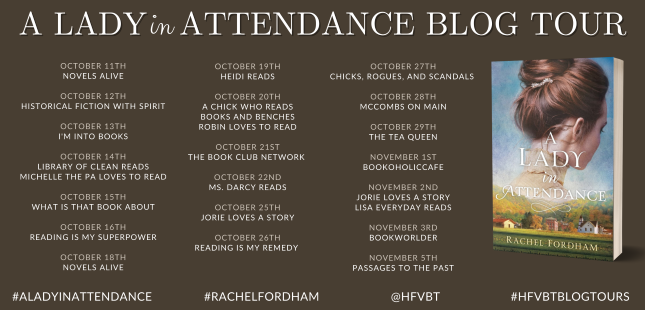A Lady in Attendance by Rachel Fordham
Publication Date: June 1, 2021
Revell
Genre: Historical Fiction/Christian/Romance
Five years in a New York state reformatory have left a blemish on Hazel's real name. So when she takes a job as Doctor Gilbert Watts's lady in attendance in 1898, she does so under an alias. In the presence of her quiet and pious employer, Hazel finds more than an income. She finds a friend and a hope that if she can set her tarnished past in order, she might have a future after all.
As Gilbert becomes accustomed to the pleasant chatter of his new dental assistant, he can't help but sense something secretive about her. Perhaps there is more to this woman than meets the eye. Can the questions that loom between them ever be answered? Or will the deeds of days gone by forever rob the future of its possibilities?
Rachel Fordham pens a tender tale of a soft-spoken man, a hardened woman, and the friends that stand by them as they work toward a common purpose--to expunge the record of someone society deemed beyond saving--and perhaps find love along the way.
"A Lady in Attendance draws you in from the first page and leaves you captivated until the oh-so-romantic conclusion. A poignant and beautifully written story of faith, forgiveness, and the healing power of love."--Mimi Matthews, USA Today bestselling author
Excerpt
Prologue House of Refuge, Hudson, New York, 1893
The coarse gray fabric of Hazel’s newly donned uniform felt uncomfortable and foreign against her skin. She scratched her neck, trying in vain to force the itch away, but it was no use. These drab clothes would likely never feel comfortable, nor would these dark walls and tall fences ever feel like home.
“You’ll get used to it,” said the girl on her right. She looked to be fifteen, maybe sixteen, and despite the dreary location wore a cheerful smile on her pale face. “It ain’t so bad here.”
The girl on Hazel’s left snickered but nodded. Both girls had been assigned to scrub the dining hall’s floor with her and had readily begun answering her questions.
“It ain’t no castle with a moat, but they feed us three times a day, and that’s more than I ate before bein’ sent to the reformatory,” the girl on her right said.
“It’s prison,” Hazel whispered, unsure why they were keeping their voices so low. “It won’t get better. Not until we get out.”
“Won’t be all better when you get out. People don’t trust no one that’s lived behind bars. Once a convict, always a convict. Even if they talk about us being trained and tutored for a better life, you’ll still be stained. Your five-year sentence might as well be a lifetime one. Enjoy the food and roof over your head while you got it.” The younger in-mate pushed her stringy hair from her face with her wet hand and stared at her with large doe-like eyes. “It’s better here’n where I came from. Better’n where most of us come from.”
Hazel wanted to argue, to tell these girls that life outside the reformatory’s walls was better. That freedom of any kind was better than iron fences. But she held back, knowing the world she had come from differed from their world. She’d had money and a family name. She cringed, remembering how her world had rejected her, the pain of her sentencing, and the stoop of her parents’ shoulders. The truth was, she wasn’t sure where she’d be at this very mo-ment if she were not here as a committed prisoner of the House of Refuge.
With her eyes on the dirty water and a heaviness in her heart, she spoke. “Tell me what it’s like living here.” She had been in such a daze when she arrived, she hardly heard the matron’s instructions. “I do wish to get through this time unscathed if I can—and perhaps somehow to have a future.”
“There’s a lady who comes by often. She runs a club or somethin’, and she’s changed it around here,” the inmate on her left said. She was older and less enthusiastic than her counterpart. “She’s helping us learn skills so we can leave changed. They’s teaching us to sew and cook, and they preach. But you gotta work hard too. You gotta listen and follow directions. If you do, you’ll get by.”
Hazel forced a smile despite the nausea assaulting her stomach. Menial labor held no appeal, yet these women spoke as though it were a gift. She chided her ungrateful heart and forced herself to listen despite her innate desire to argue and fight against her lot.
“What you gotta know is that this building’s got three floors, and you move up or down dependin’ on if you work hard and learn or if you don’t. They even got cottages inside the gates for those who are doin’ the best.”
Hazel managed to weakly say, “I hope you get to live there soon.”
“We all hope for that. The hardened women move to the first floor, and there are rooms that women have to go to all by themselves. I never wanna go there.” She was old enough that there were creases near her eyes and lines on her forehead that didn’t leave, even when her face relaxed. She picked up her brush and began scrubbing the floor again. With her head bent, she talked faster. “They have us pray every day, and preachers come and talk to us. I been hearin’ their words since coming. They talk of picking a direction to run in and stayin’ on a path. I don’t under-stand it all, but I figure if I listen to them, I’ll avoid the first floor, and maybe I could have a life that’s better’n what I’ve known. I gotta hope.” Her cheeks turned red. “I ain’t touched the bottle in months now. What you in for?”
“I’m sure she’s here for running about with some married man,” the young inmate said with a giggle. “It’s always men or drink.”
“Nah, it’s always being desperate that brings us here,” the more seasoned inmate said.
“I don’t know desperation—not like you’ve known it.” Hazel took a slow breath as she wrestled with what to tell these women about her past. She had so much regret, heartache, and hurt she could share, but instead, she simply said, “I was accused of burglary.”
“Burglary?” The younger woman’s voice jumped up an octave. “What did you steal?”
The words assaulted her, and she opened her mouth, ready to defend herself, then shut it. They assumed her guilty. Like everyone else, they believed she’d stolen and brought this fate on herself. She swallowed the pain, knowing that she was not completely innocent, nor was she guilty. But saying as much would do no good. “It mat-ters little,” she said. “I’m here now, and I suppose all that matters is if I move upstairs or down.”
Rachel Fordham, A Lady in Attendance. Revell, a division of Baker Publishing Group. June 1, 2021. Used by Permission. 








































